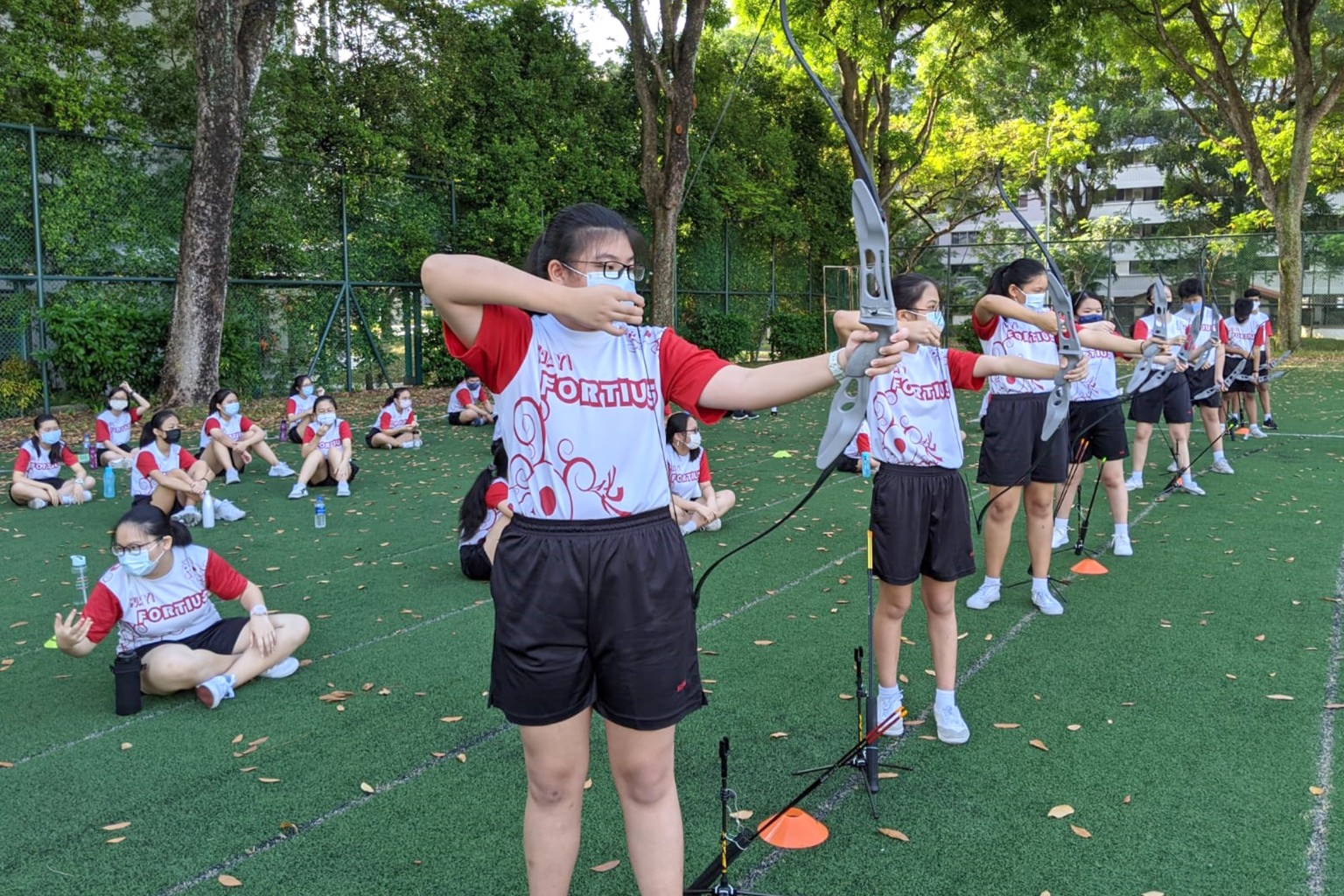Looking beyond grades, two schools find dropping the mid-year exams helps students grow
Sign up now: Get tips on how to help your child succeed

Hua Yi Secondary students participating in activities, such as archery, as part of the school's Learning Festival in October 2020.
PHOTO: HUA YI SECONDARY SCHOOL
Follow topic:
SINGAPORE -That ritual of hitting the books twice a year for school examinations - so familiar to generations of Singaporeans - has been given a makeover by schools that have dropped the mid-year exams.
At Hua Yi Secondary School, for instance, students get to try their hand at new pursuits instead, while at Gan Eng Seng Primary, pupils get the breathing room to learn at their own pace.
And across Singapore, more children will be joining them with all schools set to drop the mid-year exams in May for all levels by next year.
Hua Yi Secondary, one of the earliest schools to do away with mid-year testing for all levels, took the chance to organise a "Learning Festival", where students get to explore their interests through workshops and talks.
Examples of activities include film appreciation, an Asean culture fair, and sports activities. Students also get to pick skills to learn, like baking, sushi-making, archery and T-shirt printing.
Ms Sandra Gwee, the school's principal, said: "Without the mid-year exam, there's time for us to give the students more opportunities to do different things."
The event used to take place on a Saturday, but since 2019 it has been extended to a week, and is held twice a year in May and October.
"We want them to pursue an interest, something they really want to learn, and also learn to work together with their classmates," said Ms Gwee.
"For teachers, without the mid-year (exams), there's no rush to set exam papers and they can complete the syllabus with a bit more depth."
Hua Yi Secondary removed mid-year exams for the Secondary 1 to Sec 3 levels in 2019, followed by Sec 4 and Sec 5 in 2020.
It employs a variety of assessment methods, like class participation, quizzes, performance tasks and presentations, to evaluate students, along with the year-end exam, which counts towards 55 per cent of the final grade.
Ms Gwee said dropping the mid-year exams was part of the school's larger vision to develop students holistically, beyond academics.
In 2019, the school drew up a set of learning qualities and behaviours to assess students across academic subjects and co-curricular activities. These include staying open-minded and being self-directed - that is, able to recognise one's strengths, weaknesses and emotions - and showing initiative.

To give students more agency in their learning, the school has them select pieces of their own work for a portfolio that they present to their parents at parent-teacher conferences.
Another school that has removed all mid-year exams, Gan Eng Seng Primary, dropped them for Primary 4 pupils last year, and will do the same for the Primary 6 level this year. These were the only levels still to have the mid-year assessment.
Principal Roy Lee said: "We wanted to reduce the over-emphasis on exam results and focus more on the joy of learning. We wanted to increase pupils' intrinsic motivation to learn, rather than learn just because exams are coming."
Cutting the mid-year exams also meant that after-school enrichment, and the teaching of subjects like physical education, music, art and character and citizenship education, can carry on instead of being suspended for the exam week, he added.
"It also frees up time for teachers to use more varied and engaging ways of teaching, like technology, game-based approaches and inquiry-based learning," he said.
In the meantime, parents and pupils still get regular feedback through assignments like short written exercises and discussions throughout the year.
In place of the mid-year exam is a weighted assessment that makes up 15 per cent of the final grade. "The difference is that it's not a full paper, but it covers the content in just that term and is shorter in duration," said Mr Lee.
To assure parents that the year-end exam will not be high-stakes, the school has since 2020 stopped sorting pupils into classes by their academic abilities.
"Regardless of their results, there will still be mixed-ability classes, and we try to make sure that pupils taking standard and foundation subjects are spread out across the form classes," said Mr Lee.
"That has helped to convince parents, and we've also seen academically stronger pupils helping those who are not so strong in certain subjects."

